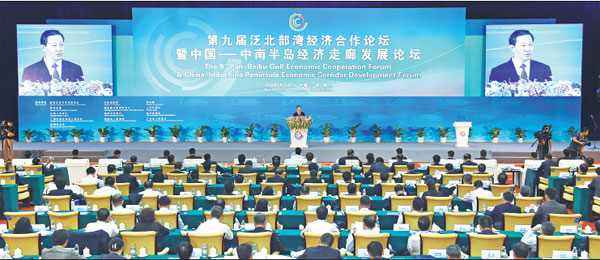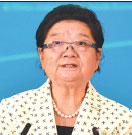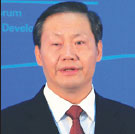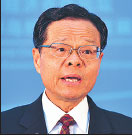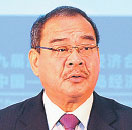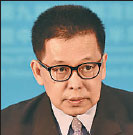Conference salutes Guangxi-ASEAN development drive
A forum aiming to show the important role Guangxi-ASEAN relations play in both the Beibu Gulf Economic Zone and Belt and Road Initiative began on Thursday in Nanning, capital city of Guangxi Zhuang autonomous region.
Speaking at the opening ceremony of the ninth Pan-Beibu Gulf Economic Cooperation Forum, Peng Qinghua, Party chief of Guangxi, said the region is both an active participant in and a direct beneficiary of the zone.
Guangxi hosts the China-ASEAN Expo and several ASEAN-related events every year, and is also actively involved in cooperation projects including Sino-Malaysian "Two Countries, Twin Parks", Sino-Indonesian economic cooperation zone, Sino-Thai industrial park, Sino-Singapore industrial park and Guangxi-Brunei economic corridor, said Peng.
Gu Xiulian, former vicechairperson of the Standing Committee of the National People's Congress, said the past eight forums have achieved fruitful results, and promoted cooperation in the Pan-Beibu Gulf, creating a win-win situation and becoming the key platform and mechanism for cooperation among Pan-Beibu Gulf countries.
Chen Wu, chairman of the autonomous region, said as host region of the Pan-Beibu Gulf forum, Guangxi had worked to improve links with ASEAN countries over the past few years.
Chen said China and ASEAN countries are close partners in the national Belt and Road Initiative, and Guangxi is devoted to both advancing the aims of ASEAN and ensuring that China's key goals for the initiative are met.
Chinese President Xi Jinping put forward the initiatives of jointly building the Silk Road Economic Belt and 21st Century Maritime Silk Road in September and October 2013.
The Belt and Road Initiative is an ambitious plan that aims to promote the orderly and free flow of economic factors, efficient resource allocation and integration of markets by improving the connectivity of Asian, European and African continents.
The plan honors mutual respect, shared objectives and win-win cooperation.
The Indochinese Peninsula represents an important direction for the Belt and Road Initiative, offering grand opportunities for China and its close neighbors in trade.
As important emerging economies, countries in this region have the same strong desire for development.
Chen noted the trade volume of Guangxi and ASEAN increased from $1.83 billion in 2006 to $29 billion in 2015, rising 37.2 percent.
ASEAN has been Guangxi's largest trading partner over the last 15 years, and Guangxi has developed an ideal platform to trade with ASEAN.
According to the Pan-Beibu Gulf administration, on the basis of economic mutual benefit, mutual cultural learning and political trust, China and Indochinese Peninsula countries will further deepen cooperation, expand space for development, build more growth drivers, and boost economic cooperation and trade.
To realize these shared objectives, on the basis of respecting sovereignty and territorial integrity, mutual non-aggression, non-interference in each other's internal afairs, equality and mutual benefit, and peaceful coexistence - as well as the principles of joint consultation, construction and sharing - Guangxi, in collaboration with ASEAN, is ready to jointly build the China-Indochinese Economic Corridor.
With Guangxi Zhuang autonomous region and Yunnan province as gateways, the economic corridor will extend to China's vast hinterland and prosperous eastern region in the north, and run through Vietnam, Laos, Cambodia, Thailand, Malaysia and Singapore in the south.
Kong Cho Ha, special envoy to China of Malaysian Prime Minister Najib Razak, noted that 2016 marks the 42nd anniversary of the establishment of Sino-Malaysian diplomatic relations, and bilateral trade has continued to grow as a result of fruitful political and business exchanges at the highest level.
He said the two countries have jointly established a "Two Countries, Twin Parks" - the Malaysia-China Kuantan Industrial Park and China-Malaysia Qinzhou Industrial Park - to further promote mutual investments.
The "Twin Parks" are connected by China's Qinzhou Port at one end and Malaysia's Kuantan Port at the other.
Winichai Chaemchaeng, Thailand's vice-minister of commerce, said the ASEAN-China Free Trade Agreement has been a powerful engine for growth for Asia due to the combination of China's dynamic economy and the unique diversified economies of ASEAN.
Excerpt of proposal on joint building of China-Indochinese Peninsula Economic Corridor
1. Step up communication and build consensus for cooperation.
We will actively coordinate our respective development strategies, plans and policies, deepen practical cooperation, respond to common concerns, and resolve issues through consultation in the building of China-Indochinese Peninsula Economic Corridor.
2. Promote connectivity and build smooth cooperation channels.
We will move forward with construction of key hub projects, and promote exchanges and harmonization of infrastructure construction plans and technical standards systems so that a smooth, convenient, fast and eficient international network of channels will take shape between China and the Indochinese Peninsula.
3. Facilitate and expand investment and trade.
We will work together to facilitate investment, trade, and flow of people, and promote customs cooperation on such issues as "two countries, one inspection". Based on the pilot comprehensive financial reform border zones in Guangxi and Yunnan, we will move forward steadily with cross-border financial cooperation to facilitate investment.
4. Encourage cultural and people-to-people exchanges to build more popular support for our cooperation.
In line with the spirit of friendship and cooperation stressed in the Belt and Road Initiative, we will further play out the role of the "Nanning Channel", build and improve the China-Indochinese Peninsula node-city cooperation mechanism, promote exchanges and cooperation in such areas as culture and education so as to build strong popular support for the China-Indochinese Peninsula Economic Corridor.
renqi@chinadaily.com.cn
|
Peng Qinghua, Party chief of Guangxi Zhuang autonomous region, delivers a keynote speech during the ninth Pan-Beibu Gulf Economic Cooperation Forum that opened on Thursday in Nanning. Deng Hua / For China Daily |
|
Gu Xiulian, former vice-chairperson of the Standing Committee of the National People's Congress |
|
Peng Qinghua, Party chief of Guangxi Zhuang autonomous region |
|
Chen Wu, chairman of Guangxi Zhuang autonomous region |
|
Kong Cho Ha, special envoy to China of Malaysian Prime Minister Najib Razak |
|
Winichai Chaemchaeng, Thailand's vice-minister of commerce |
(China Daily 05/27/2016 page24)


